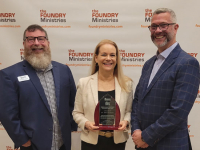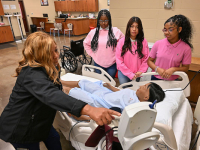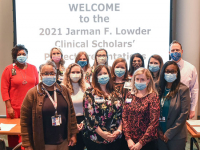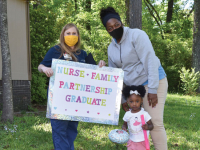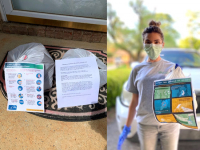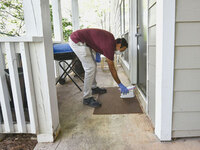
Faculty from the University of Alabama at Birmingham School of Nursing are collaborating with Children’s of Alabama through the Jarman Lowder Clinical Scholars Program to conduct evidence-based practice and quality improvement projects, empowering Children’s nurses to make a difference in patient care and helping with nursing workforce development and satisfaction.
The School’s faculty teach monthly classes about the importance of evidence-based practice and how to conduct it. The faculty also serve as mentors for the nurses during the 12-month program as they develop, implement and assess their projects, which are based upon Children’s initiatives and strategic plan.
“The scholars are very diverse and share innovative ideas that lead to exceptional quality improvement initiatives throughout various patient care units at Children's of Alabama,” said Program Director and Associate Professor Tedra Smith, DNP, CRNP, CPNP-PC, CNE (MSN 2004, DNP 2011). “These projects often directly or indirectly impact patient care.”
During the COVID-19 pandemic, this collaboration is even more important, Smith said.
“The program provides participants an outlet to focus on something other than COVID. In our sessions they are allowed to brainstorm and develop quality improvement projects around ideas they are passionate about on their unit, and not just focus on the pandemic and its impact,” Smith said.
Fourteen participants were selected for the 2021 program. Their projects varied across multiple platforms and patient care units, from addressing language barriers in the pediatric burn unit to ostomy application in the neonatal intensive care unit and how to reduce the number of times an appliance needs to be changed. With the guidance of the School’s faculty mentors, the scholars implemented approved plans and assessed the results with evidence-based measuring tools such as surveys and patient outcomes.
Alyson Mason, RN, and Harley Carlisle, RN, focused their project on nurse retention in the pediatric cardiovascular intensive care unit. “We noticed that there was a gap in our new graduate nurses transitioning from the classroom into clinical practice,” Mason said.
Mason and Carlisle administered learning needs assessments to nurses with two years of experience or less and implemented simulation in the unit’s education practices.
“Simulation is a safe environment for nurses to practice the knowledge they’ve gained in the classroom. If a nurse feels supported and confident in the role, then a nurse is more likely to stay on the unit,” Mason said.
Because the nurses are firmly embedded in patient care at Children’s, their projects are highly relevant and useful to their co-workers and the patients they serve.
“Through the scholars program, we are equipping the bedside nurses with the knowledge and skills necessary to design, implement and evaluate quality improvement projects but, most importantly, the program builds their confidence in the impact they have on their patients, colleagues and the nursing profession,” Smith said.
The Jarman Lowder Clinical Scholars Program is made possible by funding from the Thomas F. Lowder Family Foundation.



